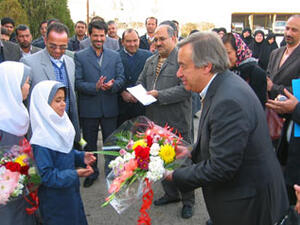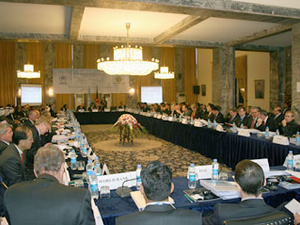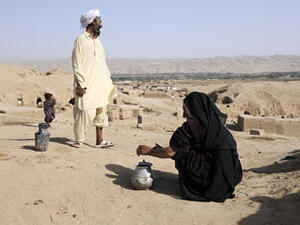Lubbers hails accord on Afghan government as 'historic milestone' and pledges help in creating a lasting peace
Lubbers hails accord on Afghan government as 'historic milestone' and pledges help in creating a lasting peace

High Commissioner Lubbers during a recent visit to the Pakistan border.
BERLIN, Dec. 5 (UNHCR) - Declaring the agreement for a new interim government in Afghanistan "an important and historic milestone," High Commissioner Ruud Lubbers Wednesday pledged his agency's support in creating a lasting peace that will allow millions of refugees to return home.
"I am particularly pleased that two women have been named to senior posts," Lubbers said in prepared remarks to the Afghan Support Group meeting in Berlin, referring to the composition of the new government. "I hope that women will play a key role in building a new, peaceful and democratic Afghanistan."
The High Commissioner added that the return of the world's largest refugee population will have a major impact on the recovery in Afghanistan. He said, however, that previous mass returns of refugees to the country were not sustainable because of renewed conflict, human rights abuses, a shattered economy, and drought.
Today, Lubbers added, the international community and Afghanistan have a new opportunity "to ensure that the necessary conditions are created to allow these refugees to return."
More than 4.5 million refugees have returned to Afghanistan since 1968, helped mainly by UNHCR and its partners. Even before the September 11 attacks on the United States, there were more than 3.5 million Afghan refugees in Pakistan and Iran alone, with tens of thousands more scattered across 70 countries worldwide.
"Refugees and internally displaced persons represent approximately one-fifth of the Afghan population, and their potential productive capacity should not be underestimated," the High Commissioner said. "These people are not simply the beneficiaries of humanitarian aid, they are important potential contributors to development."
Lubbers said a new UNHCR plan of action through mid-2002 for the region has four objectives: helping the voluntary return of Afghan refugees; providing protection and assistance to internally displaced persons inside Afghanistan; maintaining an adequate level of emergency preparedness; and supporting refugees in the countries of asylum.
The plan is expected to benefit some 900,000 people, including half-a-million internally displaced persons inside Afghanistan, 300,000 Afghan refugees in Pakistan and 80,000 in Iran. Another 20,000 Afghan refugees in the Central Asian republics are also expected to benefit from the plan.
The High Commissioner said UNHCR was ready to participate with other United Nations agencies to help internally displaced people inside Afghanistan.
Pointing to the fact that thousands of refugees and internally displaced persons have returned to their homes in Kabul and other cities as well as from Iran in recent days, Lubbers said the obstacles they face should not be underestimated. He specifically cited the destruction of homes and the millions of deadly landmines hidden in the ground across the country.









